Unit 6 Outdoor fun 前三课时复习-江苏省盐城市亭湖区永丰初级中学七年级英语下册课件(共63张PPT)
文档属性
| 名称 | Unit 6 Outdoor fun 前三课时复习-江苏省盐城市亭湖区永丰初级中学七年级英语下册课件(共63张PPT) | 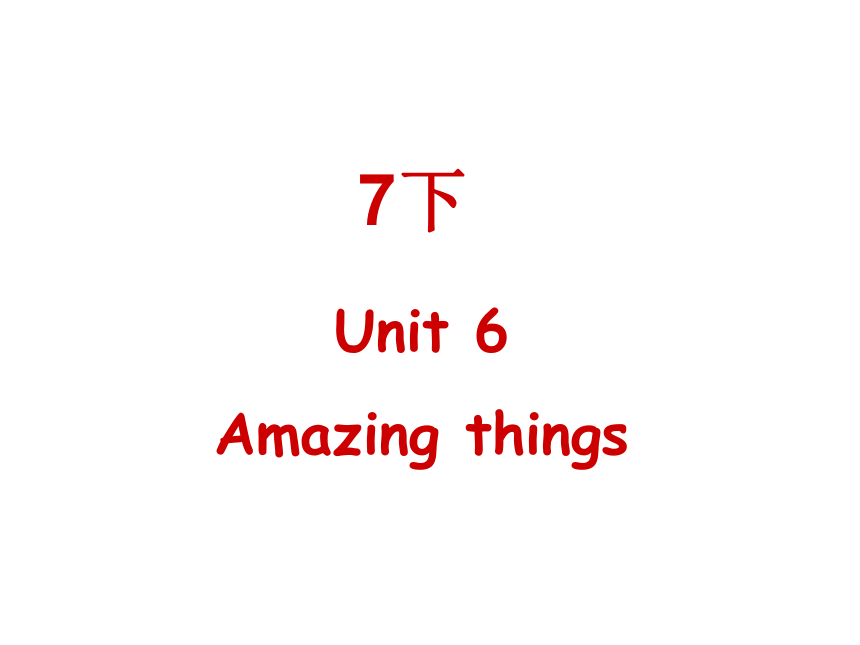 | |
| 格式 | zip | ||
| 文件大小 | 2.1MB | ||
| 资源类型 | 教案 | ||
| 版本资源 | 牛津译林版 | ||
| 科目 | 英语 | ||
| 更新时间 | 2022-04-11 15:39:45 | ||
图片预览

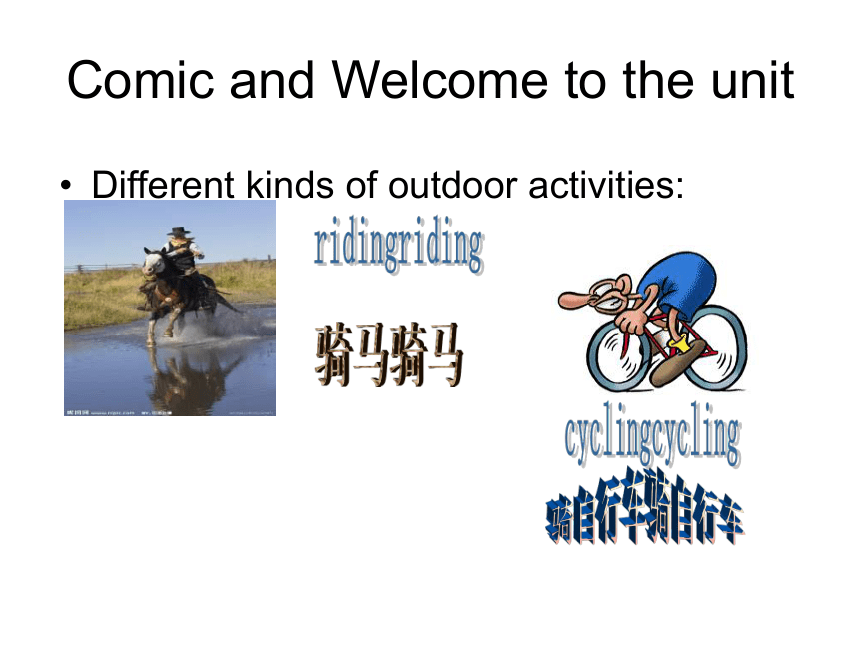
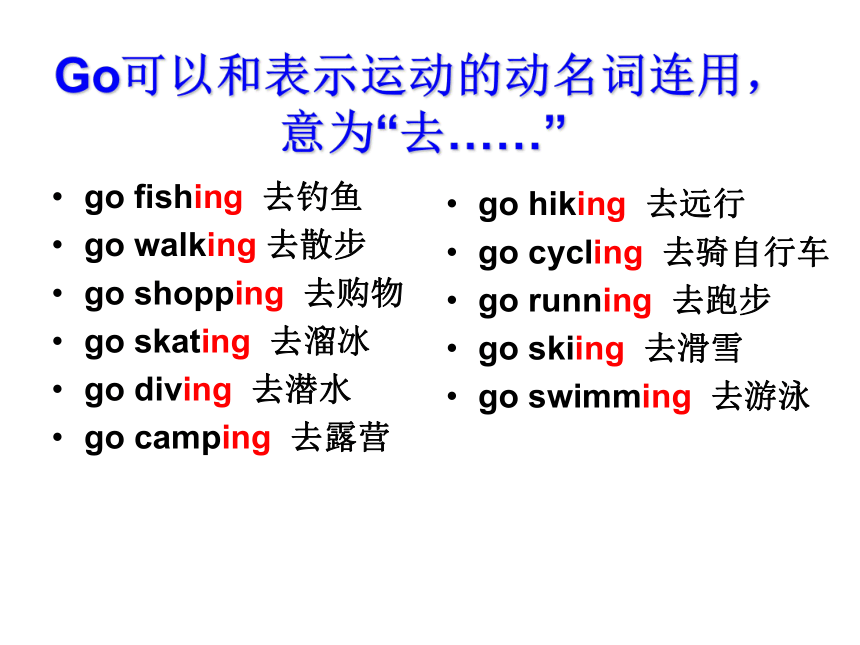
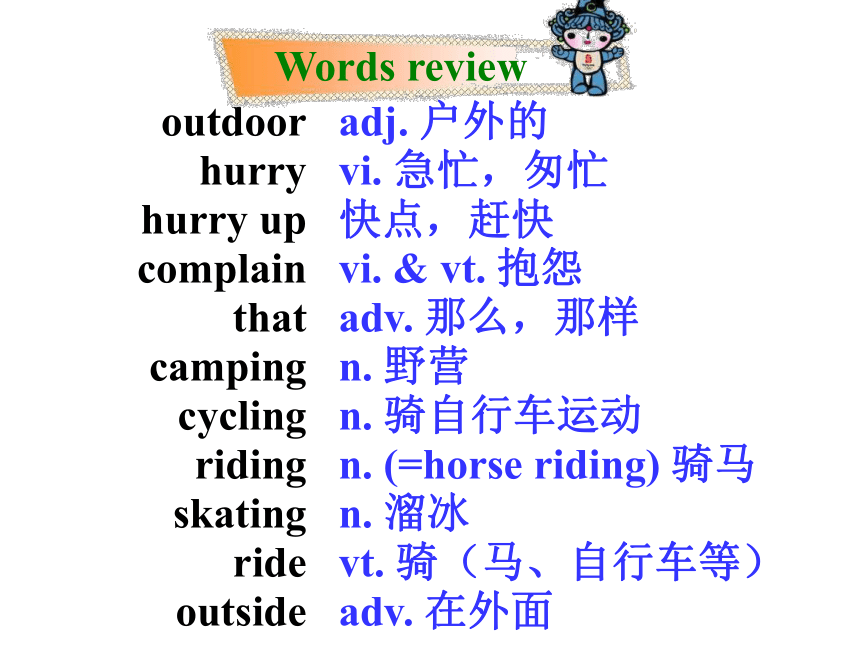
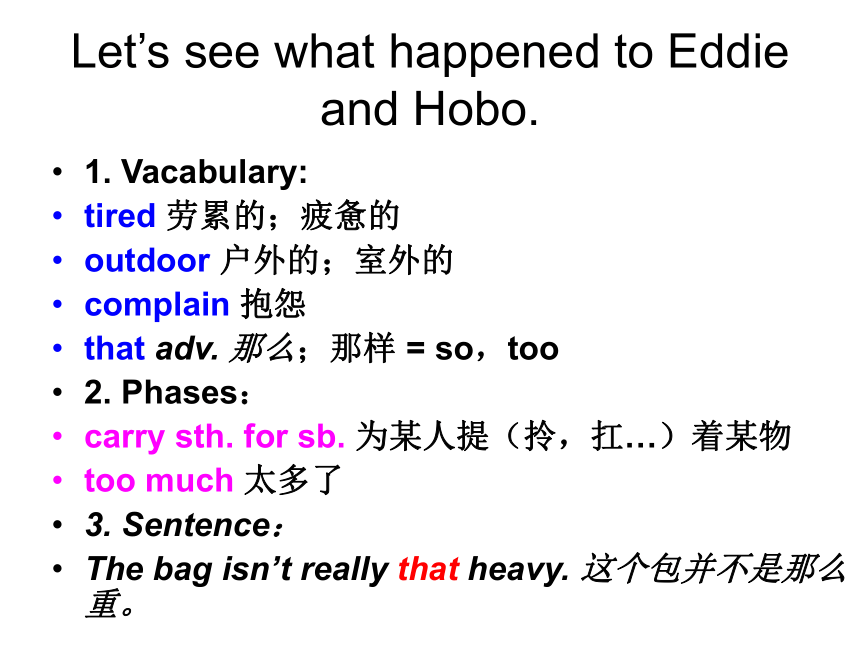
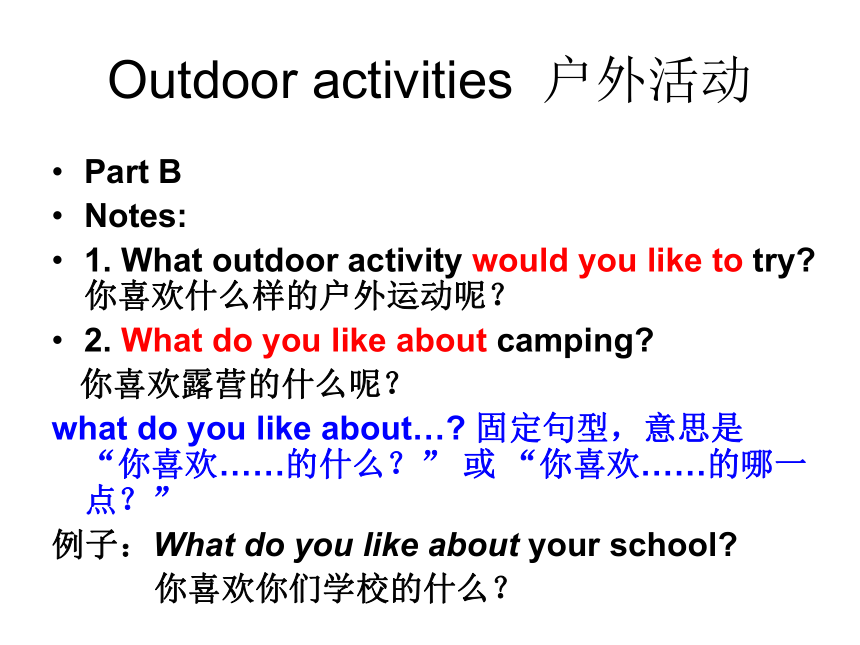
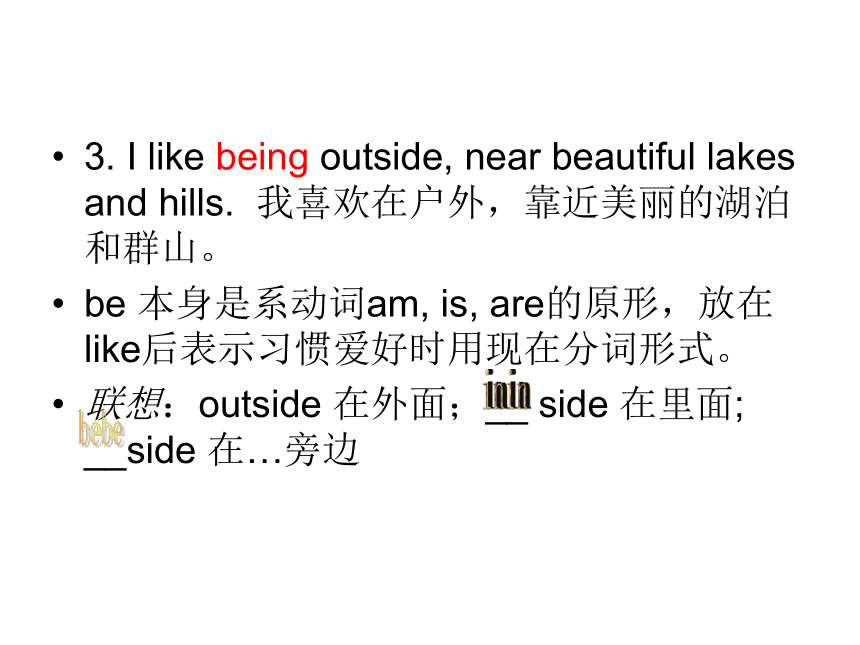
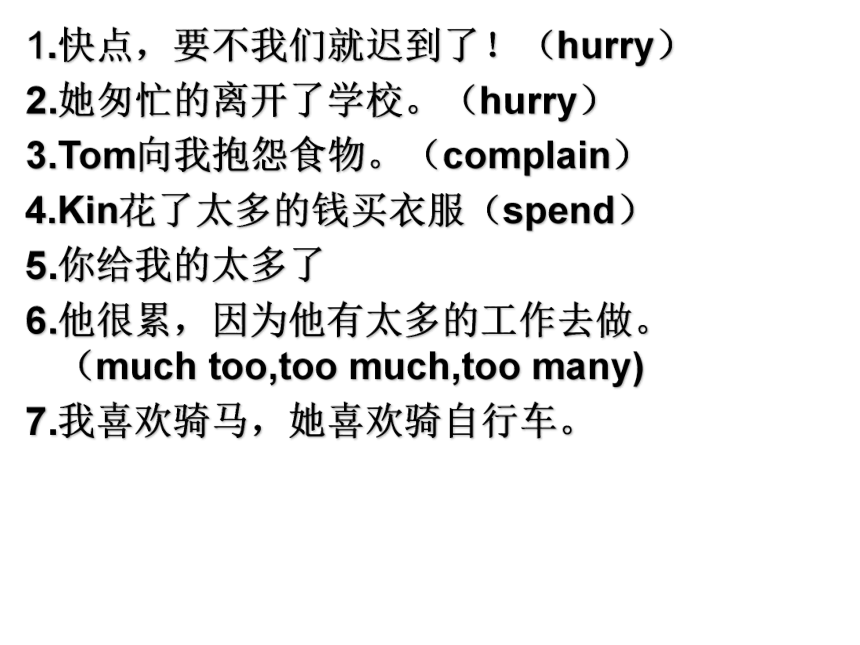
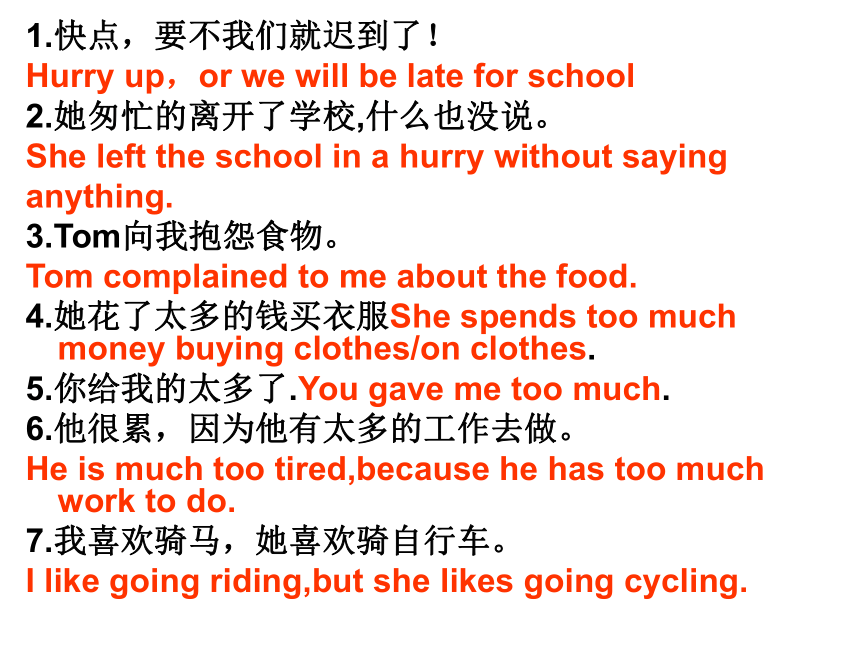
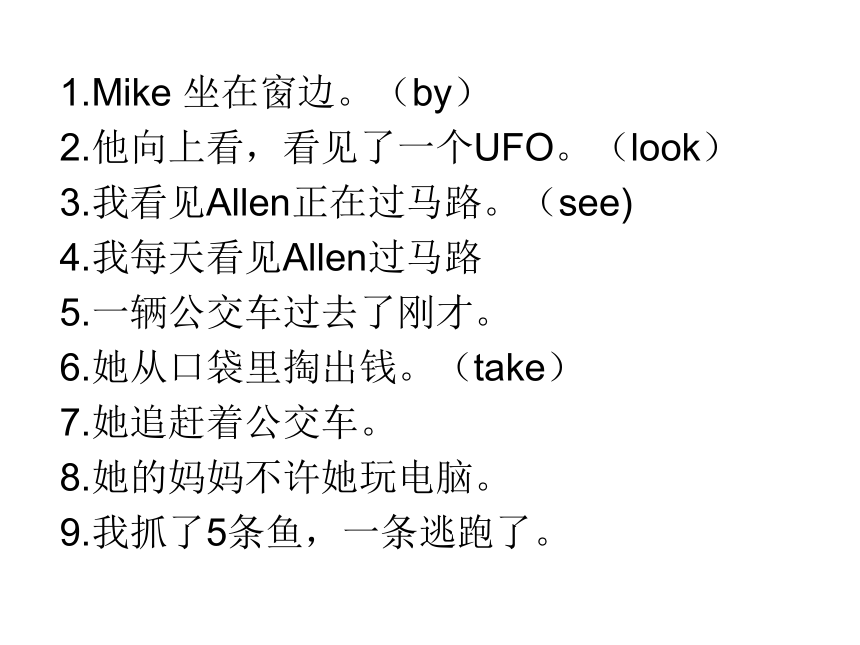
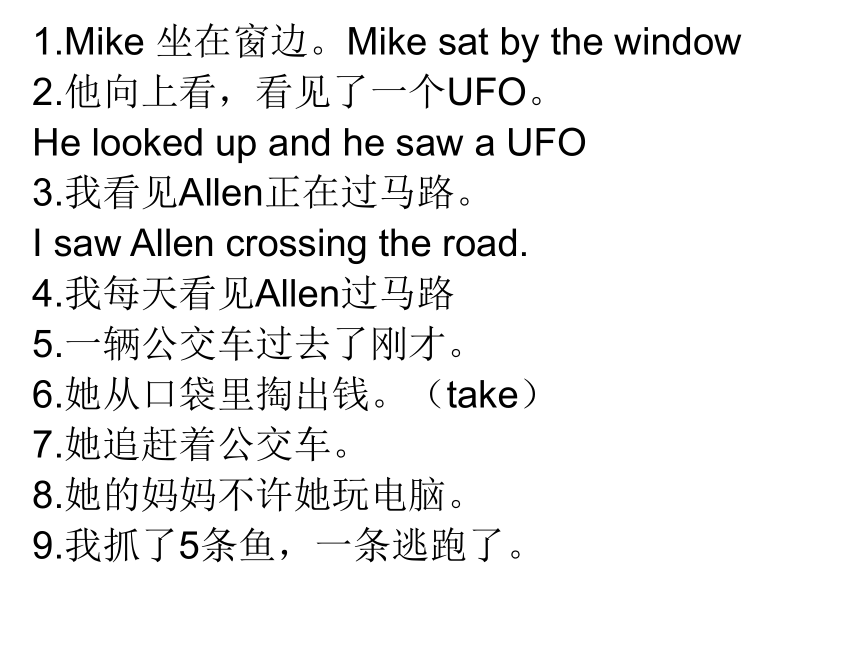
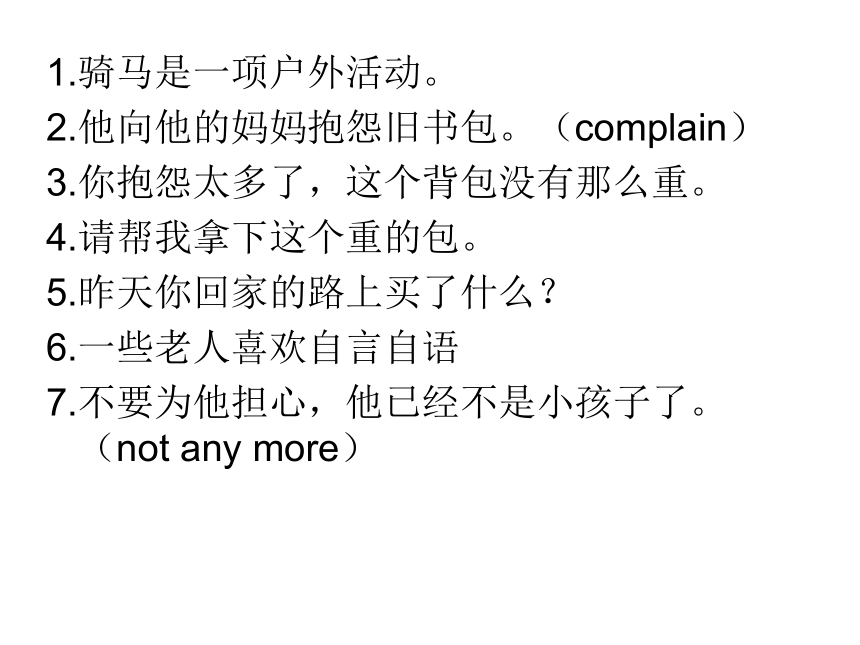
文档简介
(共63张PPT)
Unit 6
Amazing things
7下
Comic and Welcome to the unit
Different kinds of outdoor activities:
riding
骑马
cycling
骑自行车
Go可以和表示运动的动名词连用,意为“去……”
go fishing 去钓鱼
go walking 去散步
go shopping 去购物
go skating 去溜冰
go diving 去潜水
go camping 去露营
go hiking 去远行
go cycling 去骑自行车
go running 去跑步
go skiing 去滑雪
go swimming 去游泳
outdoor
hurry
hurry up
complain
that
camping
cycling
riding
skating
ride
outside
Words review
adj. 户外的
vi. 急忙,匆忙
快点,赶快
vi. & vt. 抱怨
adv. 那么,那样
n. 野营
n. 骑自行车运动
n. (=horse riding) 骑马
n. 溜冰
vt. 骑(马、自行车等)
adv. 在外面
Let’s see what happened to Eddie and Hobo.
1. Vacabulary:
tired 劳累的;疲惫的
outdoor 户外的;室外的
complain 抱怨
that adv. 那么;那样 = so,too
2. Phases:
carry sth. for sb. 为某人提(拎,扛…)着某物
too much 太多了
3. Sentence:
The bag isn’t really that heavy. 这个包并不是那么重。
Outdoor activities 户外活动
Part B
Notes:
1. What outdoor activity would you like to try 你喜欢什么样的户外运动呢?
2. What do you like about camping
你喜欢露营的什么呢?
what do you like about… 固定句型,意思是“你喜欢……的什么?” 或 “你喜欢……的哪一点?”
例子:What do you like about your school
你喜欢你们学校的什么?
3. I like being outside, near beautiful lakes and hills. 我喜欢在户外,靠近美丽的湖泊和群山。
be 本身是系动词am, is, are的原形,放在like后表示习惯爱好时用现在分词形式。
联想:outside 在外面;__ side 在里面; __side 在…旁边
in
be
1.快点,要不我们就迟到了!(hurry)
2.她匆忙的离开了学校。(hurry)
3.Tom向我抱怨食物。(complain)
4.Kin花了太多的钱买衣服(spend)
5.你给我的太多了
6.他很累,因为他有太多的工作去做。(much too,too much,too many)
7.我喜欢骑马,她喜欢骑自行车。
1.快点,要不我们就迟到了!
Hurry up,or we will be late for school
2.她匆忙的离开了学校,什么也没说。
She left the school in a hurry without saying
anything.
3.Tom向我抱怨食物。
Tom complained to me about the food.
4.她花了太多的钱买衣服She spends too much money buying clothes/on clothes.
5.你给我的太多了.You gave me too much.
6.他很累,因为他有太多的工作去做。
He is much too tired,because he has too much work to do.
7.我喜欢骑马,她喜欢骑自行车。
I like going riding,but she likes going cycling.
1.Mike 坐在窗边。(by)
2.他向上看,看见了一个UFO。(look)
3.我看见Allen正在过马路。(see)
4.我每天看见Allen过马路
5.一辆公交车过去了刚才。
6.她从口袋里掏出钱。(take)
7.她追赶着公交车。
8.她的妈妈不许她玩电脑。
9.我抓了5条鱼,一条逃跑了。
1.Mike 坐在窗边。Mike sat by the window
2.他向上看,看见了一个UFO。
He looked up and he saw a UFO
3.我看见Allen正在过马路。
I saw Allen crossing the road.
4.我每天看见Allen过马路
5.一辆公交车过去了刚才。
6.她从口袋里掏出钱。(take)
7.她追赶着公交车。
8.她的妈妈不许她玩电脑。
9.我抓了5条鱼,一条逃跑了。
1.骑马是一项户外活动。
2.他向他的妈妈抱怨旧书包。(complain)
3.你抱怨太多了,这个背包没有那么重。
4.请帮我拿下这个重的包。
5.昨天你回家的路上买了什么?
6.一些老人喜欢自言自语
7.不要为他担心,他已经不是小孩子了。(not any more)
1.骑马是一项户外活动。Riding is an outdoor activity.
2.他向他的妈妈抱怨旧书包。
He complained to his mother about the old bag.
3.你抱怨太多了,这个背包没有那么重。
You complained too much.The bag isn’t that heavy
4.请帮我拿下这个重的包。
Please carry the heavy bag for me .
5.昨天你回家的路上买了什么?
What did you buy on your way home
6.一些老人喜欢自言自语
Some old people like saying to themselves.
7.不要为他担心,他已经不是小孩子了。
Don’t worry about him.He isn’t a child any more.
看见他我很吃惊。
(surprise,比比,你能写出几种)
I was surprised at seeing him.
I was surprised to see him.
I was surprised that I met him.
To my surprise,I saw him.
Seeing him surprised me.
Seeing him made me surprised.
I saw him in surprise.
Reading
One Sunny day, Alice s___by a river with her sister.Then she h_____ a sound. She l_____ up and s_____a rabbit passing by. She s_____ up and r___across the field after the rabbit. Then she j_______ down a hole after the rabbit. She f____ for a long time. At last she f______herself in a hall. She n_________ a small door and she could see a lovely garden on the other side, but she couldn't go through the door.
at
ooked
aw
tood
an
umped
ell
ound
oticed
eard
My dream
sit
hear
look
see
stand
run
jump
fall
jump
notice
1.Alice sat by a river with her sister.
2.She looked up and saw a white rabbit in a coat passing by.
3.It took a watch out of its pocket and looked at the time.
4.How amazing!
5.Alice stood up and ran across the field after the rabbit.
6.Alice didn’t want to let the rabbit get away.
7.Alice fell for a long time
8.She hit the ground.
9.She found herself alone in a long ,low hall.
10.They were all locked.
11.It did not fit any of the doors.
12.Then Alice noticed a small door and put the key into it.
13.Alice tried to go through the door.
14.The strange rabbit surprised Alice
15.Alice saw a white rabbit passing by.
one sunny day
one 表示不确定的某一天 (用于过去时)
在一个晴朗的一天
e.g. 一个星期天的早晨,我和父亲一起去河边钓鱼。
_______________________, father and I
____ fishing ___ the river.
Language points
went by
一个晴朗的一天
on a sunny day
One Sunday morning
2. by
prep.在…旁边,靠近
adv. 经过
by the river
pass by
1) She likes sitting in the coffee shop __________.
(在河边的咖啡馆里)
by the river
2) He _____ ____ and saw a man ________ ____.
(他抬头看,看见了一个男子经过)
by
3. pass
vi. 经过,通过
vt. 通过;经过;传递
pass by
1)The man is ___________(经过) the police station.
passing (by)
2) Work hard, and you ___ ____ the exam.(考试及格)
will pass
3) Please _____the book __the boy.(请把书递给我)
pass
to
pass sth. to sb.
= pass sb. sth.
pass the exam
looked
up
passing
4. See/hear sb. doing sth.
看/听到某人在做某事
See/hear sb. do sth.
看/听到某人做某事
(强调经常)
强调看到全过程
强调看到连续动作过程
强调某一刻,看到某人正在做某事
1.I often see her _______(run) in the park.
2.When I passed the classroom, I heard a girl ________ (sing) in it.
3.I saw him ______(wash) his face and _____(walk) away.
4. I can see you ________ (write) carefully now.
5. I often hear the boys ______(talk) about computer games.
run
singing
wash
walk
writing
talk
the boy ___ the bike
骑自行车的男生
a girl ___ a red dress
一个穿红色连衣裙的女孩
表示某人穿着什么样的衣服用介词in, 介词短语作定语修饰名词后置
5. a white rabbit in a coat
in
on
6. be late
迟到
be late for
做……迟到
Don’t ___ _____ ____ school.
上学不要迟到。
be
late
for
7. take a watch out of its pocket
take...out of...
从……拿出……
她从手提包里拿出了钥匙。
She _____ her keys ____ ___ the handbag.
out of
took
8. How amazing!
How+ ___________+______+_______!
adj/adv.
S(主语)
V(谓语)
2) Jim 跑得真快!
1)那个男孩多高啊!
_____ _____ ___ boy is !
How
tall
the
How ____ Jim_____!
fast
runs
What + ____+____ +_____ +s主语 + v谓语!
a/an
adj.
单数n.
What +____ +____________+s主语 + v谓语!
adj.
复数n./不可数n.
= What __ ___ boy___ is !
a
tall
he
9. run across the field after the rabbit
追着兔子穿过田野
across 穿过,横过
(从表面)
过马路
go across the road
run after
追赶
我刚才看到一只猫在追一只老鼠。
I ___ a cat ________ ______ a mouse just now
after
saw
running
get away
逃脱,离开
e. g. 不要让小偷逃走
Don’t ______ the thief _____ ______.
away
let
10. let the rabbit get away
让兔子逃走
let sb. do sth.
让某人做某事
get
11. fall
fall off …
跌落,从……落下
fall down
滑倒,倒下
fall into…
掉进…
1) The girl _______ the bike.
(从自行车上摔下来了)
fell off
2) The old woman ________.
3) The boy _________ the river. (掉进了)
fell down
(摔倒了)
fell into
for + 一段时间
e.g. for two days
提问用 How long...
12. for a long time
vi.落下,掉落,倒
很长时间
13. hit the ground
hit
击中,到达,撞
(hit, hitting)
e.g. 公共汽车撞到了桥了。
The bus _____ the bridge.
hit
14. find herself alone
发现她自己独自一人
find oneself alone
发现某人自己独自一人
find oneself alone + sp.
发现某人自己独自在某地
1) 当他醒来时,他发现自己独自在一个奇怪的房间
He ______ _______ _____ in a strange room
found
himself
alone
when he woke up.
find sb./sth. + adj.
发觉 …处于某种状态
2) He read a story and ______ ___ __________ .
(发现它有趣)
found
it
interesting
15. herself
她自己
当主语和宾语是同一个人时,需要用反身代词
1) The little girl found ______ (she) in a dark room.
herself
2) “Don’t be afraid.”, she said to _______. (her)
herself
16. alone
adj. /adv.独自,单独
alone
=
1) The old man _______ ____ by the river.
(独自一人住在)
lives
alone
2) Tom 总是一个人走到学校.
Tom always ______ ___ school ______ .
walks
to
alone
3) Lucy ________ (she) will look after the child .
herself
(做主语的同位语)
on one’s own
=
by oneself
17. all around
四处, 到处, 周围
e.g.到处都是汽车
1) There __________ cars _____ ________.
are / were
all
around
18. be locked
锁着的
1) The doors _____ ____ ______ and we couldn’t
get in.
都锁着
were
all
locked
2) The dog can’t get out because the door is
________ (lock) .
locked
2) The classmates _____ ____ ________ ____ just
now.
都围着他
were
around
all
him
19. fit any of the doors
适合任何一扇门
……中的任何
any of ...
fit
适合于
1) This coat ___ you ____ _____.
很适合你
fits
very
well
2) 你认识那些学生中的任何一些吗?
Do you know ____ __ the students over there
of
any
20. notice
v.注意,察觉
n.通知,注意
sb. do sth.
sb. doing sth.
注意到某人在做某事
注意到某人做某事
She noticed a man ________(stand) by the river
for a long time.
standing
2) 你看到告示了吗?
_____ you see the ______
Did
notice
21. put...into...
把……放进……
e.g. 他把表放进了口袋里。
He ___ the watch ____ the ______.
pocket
put
into
22. on the other side
在另一边
the other 表示两者中的另一个
1) 在路的另一边有很多树。
There are many trees _____________ of the road.
on the other side
2) There are many trees on _____ _____(两边) of
the road.
sides
= _____ side
both
each
23. try to do sth.
尝试做……
尽力做……
e.g. Alice _______ open the door _____ the key.
尝试用钥匙打开门
tried to
with
24. go through
穿过
through
指从内部穿过
across
从表面穿过
across
through
1)The boy is swimming ______the river.
2) The sun shines _________ the window.
3)The train is going_________ the tunnel (隧道).
4) You can’t go ________ the road without looking.
5) They walked _______ the door one by one.
6) She ran ________ the field after the dog .
across
through
through
across
through
across
road
street
river
bridge
field
door
window
gate
park
forest
tunnel
25. surprise
vt.使惊奇,使措手不及
surprise sb.
使某人惊奇
be surprised to do sth.
惊奇地做某事
The gift on the table ________ ____ a lot when I
opened the door.
(使我非常惊奇)
surprised
me
2) I am _________ ___ _____ the gift on the table.
(惊奇地看到)
surprised
to
see
26. open the door with the key
do sth. with sth.
用某物做某事
=
use sth. to do sth.
e.g. He ______ the door ____the key.用钥匙打开了门.
with
=
He_______ the key ___ ______ the door.
opened
used
to
open
One sunny day, Alice sat by the river with her sister.
She saw a white rabbit in a coat passing by.
The rabbit took a watch out of its pocket.
一个晴朗的日子,爱丽丝和她的妹妹坐在河边。
她看到一只穿着外套的白色兔子经过。
兔子从口袋里拿出手表。
Exercises:
汉译英。
Alice stood up and ran across the field after the rabbit.
She didn’t want to let the rabbit get away.
爱丽丝站起身来追着兔子穿过了田野。
她不想让兔子跑掉。
Alice saw a key on the table, but it didn’t fit any of the doors.
She could see a lovely garden on the other side.
爱丽丝看到桌上有把钥匙,但是打不开任何门。
她能看到在另一边有一个可爱的花园。
1.汽车撞到一个小男孩。hit
2.我发现我在一个矮矮的大厅里。find
3.落到地上花费了Alice很长时间。take
4.那个孤独的男人独自生活,但他从来不觉得孤独。(lonely,alone)
5.有一条河穿过我们城市。(across, through)
6.路的两边有许多花。(side)
7.我注意到他正在做白日梦。(notice)
8.看见他我很吃惊。(surprise,比比,你能写出几种)
1.汽车撞到一个小男孩。The car hit the boy
2.他们发现他们在一个矮矮的大厅里。
They found themselves in a low hall
3.落到地上花费了Alice很长时间。
It took Alice a long time to hit the ground.
4.那个孤独的男人独自生活,但他从来不觉得孤独。The lonely man lives alone,but he never feels lonely.
5.有一条河穿过我们城市。
There is a river through our city.
6.路的两边有许多花。
There are many flowers on both sides.
7.我注意到他正在做白日梦。
I noticed him day dreaming
8.看见他我很吃惊。(surprise,比比,你能写出几种)
一般过去时(II)
Simple past tense
was / were
Alice outside one sunny day.
was
She at home one sunny day.
wasn’t
They in the field.
were
They on the playground.
weren’t
was not
were not
be
be
一般过去时句式
be 动词
肯定句: .
主语+was/were+其他
否定句: .
主语+was/were not+其他
Practise
Mary (be) at home yesterday. She (be not) at school .
2. The boy (be) in the library now. But he
(be) in the classroom just now, because he had an Chinese lesson.
3. We (be not) in Beijing last week.
We (be) at home.
4. Kitty and I (be not) happy because of the bad weather this morning.
was
wasn’t
is
wasn’t
weren’t
were
weren’t
The rabbit a watch out of its pocket.
took
The rabbit a carrot out of its pocket.
didn’t take
did not take
Alice down a hole after the rabbit.
jumped
Alice down a river after the rabbit.
didn’t jump
take
jump
一般过去时句式
行为动词
肯定句: .
主语+动词过去式+其他
否定句: .
主语+did not +动词原形+其他
Practise
We always (go) to Shanghai when I was a child.
2. They (not go) to school last Wednesday, they (have) a match.
3. Mike (drive) to Nanjing three days ago, he
(not, take) a train there.
4. She seldom (arrive) home late after work, but she (come) back at 10p.m. yesterday.
went
didn’t go
had
drove
didn’t take
arrived
came
Was Alice surprised at the rabbit
Yes, she was.
Was Alice angry at the rabbit
No, she wasn’t.
Yes, she did.
Did Alice find the key to the door
Did Alice go through the small door
No, she didn’t.
一般疑问句:
be 动词
行为动词
一般过去时句式
Was/were+主语+其他?
Yes,主语 +was/were.
No,主语 +wasn’t/weren’t.
Did+主语+动词原形+其他?
Yes,主语+did.
No,主语+ didn’t.
1. Mr. Black is going to marry a girl he
______ in Japan last year.
(内蒙古包头)
A. meets B. met
C. has met D. would meet
2. — Do you know who cleaned the
blackboard, Tina
— Yes. John ______. (四川德阳)
A. do B. does C. did
选择正确答案
Practise
3. — What did Mr. Smith do before he
came to China
— He ______ in a car factory.
(山东)
A. works B. worked
C. is working D. will work
4. Hello! I'm very glad to see you. When
______ you ______ here
(山东青岛)
A. did; arrive B. will; arrive
C. have; arrived D. are; arriving
5. Paul and I ______ tennis yesterday. He
did much better than I. (北京)
A. play B. will play
C. played D. are playing
6. — Where were you last Saturday
— I ____ in the Capital Museum.
(北京)
A. am B. will be
C. was D. have been
1. Lucy did her homework at home.
(否定句)
Lucy _______ _____ her homework
at home.
2. He found some meat in the fridge.
(一般疑问句)
______ he _____ ______ meat in the
fridge
didn’t
do
any
find
Did
II. 改写句子。
3. She stayed there for a week.
(划线部分提问)
_____ _____ ____ she _____ there
4. There was some orange juice in the
cup. (一般疑问句)
_____ there _____ orange juice in the
cup
stay
did
long
How
any
Was
The girl was at home last night.
(改成一般疑问句,并作肯 定回答)
2. They played football on the playground ten minutes ago.
(改成一般疑问句,并作否定回答)
Was the girl at home last night
Yes, she was.
Did they play football on the playground ten minutes ago
No, they didn’t.
be
am
is
are
was
were
肯定式:主语 + was / were + …
否定式:主语 + was not (wasn’t) /
were not (weren’t) + …
一般疑问式:
Was / Were + 主语 + …
Yes, 主语 + was / were.
No, 主语 + was not (wasn’t) / were not (weren’t).
Simple past tense of the verb ‘to be’
一般
过去时
构成
用法
常用
时间
动词的过去式
1. 表示过去某个时
间发生的动作或
存在的状态。
2. 表示过去经常或
反复发生的动作。
yesterday
last night
in 1990
two days ago …
1. Lucy did her homework at home.(改否定句)
Lucy ______ ___ her homework at home.
2. He found some meat in the fridge. (变一般疑问句)
____ he ____ ____ meat in the fridge
3. She stayed there for a week. (对划线部分提问)
____ ____ ___ she ____ there
4. There was some orange in the cup. (变一般疑问句)
_____ there ___ orange in the cup
didn’t do
Did find any
How long did stay
Was any
改写句子。
5. Did he ____ to sleep late last night
A. went B. go
C. goes D. going
6. My father _____ ill yesterday.
A. isn't B. aren't
C. wasn't D. weren't
7. ______ your parents at home last
week
A. Is B. Was
C. Are D. Were
8. The twins ______ in Dalian last year.
They ______ here now.
A. are; were B. were; are
C. was; are D. were; was
9. _____ your uncle at work the day
_____ yesterday (前天)
A. Was; before B. Is; before
C. Was; after D. Is; after
10. — Who was on duty last Friday
— ______.
A. I am B. I was
C. Yes, I was D. No, I wasn't
3. — What did Mr. Smith do before he
came to China
— He ______ in a car factory.
(山东)
A. works B. worked
C. is working D. will work
4. Hello! I'm very glad to see you. When
______ you ______ here
(山东青岛)
A. did; arrive B. will; arrive
C. have; arrived D. are; arriving
5. Paul and I ______ tennis yesterday. He
did much better than I. (北京)
A. play B. will play
C. played D. are playing
6. — Where were you last Saturday
— I ____ in the Capital Museum.
(北京)
A. am B. will be
C. was D. have been
III. 翻译句子。
1. 上周末你做什么了?
2. 星期六的早上,我踢足球了。
3. 星期天的晚上,我看电视了。
On Saturday morning, I played soccer.
On Sunday night, I watched TV.
What did you do last weekend
4. 我过了一个忙碌但却有趣的周末。
I had a busy but interesting
weekend.
5. Emma每天都看电视。可是昨天她
没有看。
Emma watches TV everyday, but she
didn’t watch TV yesterday.
6. 今天早上我遇到了林涛。
I met Lin Tao this morning.
7. 他过去抽烟,但现在不抽了。
He smoked in the past, but not now.
8. 她刚才还在这里。
She was here just now.
9. 他什么时候出生的?2000年。
When was he born In 2000.
10. 我在打扫教室的时候,发现地上有
块表。
When I cleaned the classroom, I
found a watch on the floor.
Unit 6
Amazing things
7下
Comic and Welcome to the unit
Different kinds of outdoor activities:
riding
骑马
cycling
骑自行车
Go可以和表示运动的动名词连用,意为“去……”
go fishing 去钓鱼
go walking 去散步
go shopping 去购物
go skating 去溜冰
go diving 去潜水
go camping 去露营
go hiking 去远行
go cycling 去骑自行车
go running 去跑步
go skiing 去滑雪
go swimming 去游泳
outdoor
hurry
hurry up
complain
that
camping
cycling
riding
skating
ride
outside
Words review
adj. 户外的
vi. 急忙,匆忙
快点,赶快
vi. & vt. 抱怨
adv. 那么,那样
n. 野营
n. 骑自行车运动
n. (=horse riding) 骑马
n. 溜冰
vt. 骑(马、自行车等)
adv. 在外面
Let’s see what happened to Eddie and Hobo.
1. Vacabulary:
tired 劳累的;疲惫的
outdoor 户外的;室外的
complain 抱怨
that adv. 那么;那样 = so,too
2. Phases:
carry sth. for sb. 为某人提(拎,扛…)着某物
too much 太多了
3. Sentence:
The bag isn’t really that heavy. 这个包并不是那么重。
Outdoor activities 户外活动
Part B
Notes:
1. What outdoor activity would you like to try 你喜欢什么样的户外运动呢?
2. What do you like about camping
你喜欢露营的什么呢?
what do you like about… 固定句型,意思是“你喜欢……的什么?” 或 “你喜欢……的哪一点?”
例子:What do you like about your school
你喜欢你们学校的什么?
3. I like being outside, near beautiful lakes and hills. 我喜欢在户外,靠近美丽的湖泊和群山。
be 本身是系动词am, is, are的原形,放在like后表示习惯爱好时用现在分词形式。
联想:outside 在外面;__ side 在里面; __side 在…旁边
in
be
1.快点,要不我们就迟到了!(hurry)
2.她匆忙的离开了学校。(hurry)
3.Tom向我抱怨食物。(complain)
4.Kin花了太多的钱买衣服(spend)
5.你给我的太多了
6.他很累,因为他有太多的工作去做。(much too,too much,too many)
7.我喜欢骑马,她喜欢骑自行车。
1.快点,要不我们就迟到了!
Hurry up,or we will be late for school
2.她匆忙的离开了学校,什么也没说。
She left the school in a hurry without saying
anything.
3.Tom向我抱怨食物。
Tom complained to me about the food.
4.她花了太多的钱买衣服She spends too much money buying clothes/on clothes.
5.你给我的太多了.You gave me too much.
6.他很累,因为他有太多的工作去做。
He is much too tired,because he has too much work to do.
7.我喜欢骑马,她喜欢骑自行车。
I like going riding,but she likes going cycling.
1.Mike 坐在窗边。(by)
2.他向上看,看见了一个UFO。(look)
3.我看见Allen正在过马路。(see)
4.我每天看见Allen过马路
5.一辆公交车过去了刚才。
6.她从口袋里掏出钱。(take)
7.她追赶着公交车。
8.她的妈妈不许她玩电脑。
9.我抓了5条鱼,一条逃跑了。
1.Mike 坐在窗边。Mike sat by the window
2.他向上看,看见了一个UFO。
He looked up and he saw a UFO
3.我看见Allen正在过马路。
I saw Allen crossing the road.
4.我每天看见Allen过马路
5.一辆公交车过去了刚才。
6.她从口袋里掏出钱。(take)
7.她追赶着公交车。
8.她的妈妈不许她玩电脑。
9.我抓了5条鱼,一条逃跑了。
1.骑马是一项户外活动。
2.他向他的妈妈抱怨旧书包。(complain)
3.你抱怨太多了,这个背包没有那么重。
4.请帮我拿下这个重的包。
5.昨天你回家的路上买了什么?
6.一些老人喜欢自言自语
7.不要为他担心,他已经不是小孩子了。(not any more)
1.骑马是一项户外活动。Riding is an outdoor activity.
2.他向他的妈妈抱怨旧书包。
He complained to his mother about the old bag.
3.你抱怨太多了,这个背包没有那么重。
You complained too much.The bag isn’t that heavy
4.请帮我拿下这个重的包。
Please carry the heavy bag for me .
5.昨天你回家的路上买了什么?
What did you buy on your way home
6.一些老人喜欢自言自语
Some old people like saying to themselves.
7.不要为他担心,他已经不是小孩子了。
Don’t worry about him.He isn’t a child any more.
看见他我很吃惊。
(surprise,比比,你能写出几种)
I was surprised at seeing him.
I was surprised to see him.
I was surprised that I met him.
To my surprise,I saw him.
Seeing him surprised me.
Seeing him made me surprised.
I saw him in surprise.
Reading
One Sunny day, Alice s___by a river with her sister.Then she h_____ a sound. She l_____ up and s_____a rabbit passing by. She s_____ up and r___across the field after the rabbit. Then she j_______ down a hole after the rabbit. She f____ for a long time. At last she f______herself in a hall. She n_________ a small door and she could see a lovely garden on the other side, but she couldn't go through the door.
at
ooked
aw
tood
an
umped
ell
ound
oticed
eard
My dream
sit
hear
look
see
stand
run
jump
fall
jump
notice
1.Alice sat by a river with her sister.
2.She looked up and saw a white rabbit in a coat passing by.
3.It took a watch out of its pocket and looked at the time.
4.How amazing!
5.Alice stood up and ran across the field after the rabbit.
6.Alice didn’t want to let the rabbit get away.
7.Alice fell for a long time
8.She hit the ground.
9.She found herself alone in a long ,low hall.
10.They were all locked.
11.It did not fit any of the doors.
12.Then Alice noticed a small door and put the key into it.
13.Alice tried to go through the door.
14.The strange rabbit surprised Alice
15.Alice saw a white rabbit passing by.
one sunny day
one 表示不确定的某一天 (用于过去时)
在一个晴朗的一天
e.g. 一个星期天的早晨,我和父亲一起去河边钓鱼。
_______________________, father and I
____ fishing ___ the river.
Language points
went by
一个晴朗的一天
on a sunny day
One Sunday morning
2. by
prep.在…旁边,靠近
adv. 经过
by the river
pass by
1) She likes sitting in the coffee shop __________.
(在河边的咖啡馆里)
by the river
2) He _____ ____ and saw a man ________ ____.
(他抬头看,看见了一个男子经过)
by
3. pass
vi. 经过,通过
vt. 通过;经过;传递
pass by
1)The man is ___________(经过) the police station.
passing (by)
2) Work hard, and you ___ ____ the exam.(考试及格)
will pass
3) Please _____the book __the boy.(请把书递给我)
pass
to
pass sth. to sb.
= pass sb. sth.
pass the exam
looked
up
passing
4. See/hear sb. doing sth.
看/听到某人在做某事
See/hear sb. do sth.
看/听到某人做某事
(强调经常)
强调看到全过程
强调看到连续动作过程
强调某一刻,看到某人正在做某事
1.I often see her _______(run) in the park.
2.When I passed the classroom, I heard a girl ________ (sing) in it.
3.I saw him ______(wash) his face and _____(walk) away.
4. I can see you ________ (write) carefully now.
5. I often hear the boys ______(talk) about computer games.
run
singing
wash
walk
writing
talk
the boy ___ the bike
骑自行车的男生
a girl ___ a red dress
一个穿红色连衣裙的女孩
表示某人穿着什么样的衣服用介词in, 介词短语作定语修饰名词后置
5. a white rabbit in a coat
in
on
6. be late
迟到
be late for
做……迟到
Don’t ___ _____ ____ school.
上学不要迟到。
be
late
for
7. take a watch out of its pocket
take...out of...
从……拿出……
她从手提包里拿出了钥匙。
She _____ her keys ____ ___ the handbag.
out of
took
8. How amazing!
How+ ___________+______+_______!
adj/adv.
S(主语)
V(谓语)
2) Jim 跑得真快!
1)那个男孩多高啊!
_____ _____ ___ boy is !
How
tall
the
How ____ Jim_____!
fast
runs
What + ____+____ +_____ +s主语 + v谓语!
a/an
adj.
单数n.
What +____ +____________+s主语 + v谓语!
adj.
复数n./不可数n.
= What __ ___ boy___ is !
a
tall
he
9. run across the field after the rabbit
追着兔子穿过田野
across 穿过,横过
(从表面)
过马路
go across the road
run after
追赶
我刚才看到一只猫在追一只老鼠。
I ___ a cat ________ ______ a mouse just now
after
saw
running
get away
逃脱,离开
e. g. 不要让小偷逃走
Don’t ______ the thief _____ ______.
away
let
10. let the rabbit get away
让兔子逃走
let sb. do sth.
让某人做某事
get
11. fall
fall off …
跌落,从……落下
fall down
滑倒,倒下
fall into…
掉进…
1) The girl _______ the bike.
(从自行车上摔下来了)
fell off
2) The old woman ________.
3) The boy _________ the river. (掉进了)
fell down
(摔倒了)
fell into
for + 一段时间
e.g. for two days
提问用 How long...
12. for a long time
vi.落下,掉落,倒
很长时间
13. hit the ground
hit
击中,到达,撞
(hit, hitting)
e.g. 公共汽车撞到了桥了。
The bus _____ the bridge.
hit
14. find herself alone
发现她自己独自一人
find oneself alone
发现某人自己独自一人
find oneself alone + sp.
发现某人自己独自在某地
1) 当他醒来时,他发现自己独自在一个奇怪的房间
He ______ _______ _____ in a strange room
found
himself
alone
when he woke up.
find sb./sth. + adj.
发觉 …处于某种状态
2) He read a story and ______ ___ __________ .
(发现它有趣)
found
it
interesting
15. herself
她自己
当主语和宾语是同一个人时,需要用反身代词
1) The little girl found ______ (she) in a dark room.
herself
2) “Don’t be afraid.”, she said to _______. (her)
herself
16. alone
adj. /adv.独自,单独
alone
=
1) The old man _______ ____ by the river.
(独自一人住在)
lives
alone
2) Tom 总是一个人走到学校.
Tom always ______ ___ school ______ .
walks
to
alone
3) Lucy ________ (she) will look after the child .
herself
(做主语的同位语)
on one’s own
=
by oneself
17. all around
四处, 到处, 周围
e.g.到处都是汽车
1) There __________ cars _____ ________.
are / were
all
around
18. be locked
锁着的
1) The doors _____ ____ ______ and we couldn’t
get in.
都锁着
were
all
locked
2) The dog can’t get out because the door is
________ (lock) .
locked
2) The classmates _____ ____ ________ ____ just
now.
都围着他
were
around
all
him
19. fit any of the doors
适合任何一扇门
……中的任何
any of ...
fit
适合于
1) This coat ___ you ____ _____.
很适合你
fits
very
well
2) 你认识那些学生中的任何一些吗?
Do you know ____ __ the students over there
of
any
20. notice
v.注意,察觉
n.通知,注意
sb. do sth.
sb. doing sth.
注意到某人在做某事
注意到某人做某事
She noticed a man ________(stand) by the river
for a long time.
standing
2) 你看到告示了吗?
_____ you see the ______
Did
notice
21. put...into...
把……放进……
e.g. 他把表放进了口袋里。
He ___ the watch ____ the ______.
put
into
22. on the other side
在另一边
the other 表示两者中的另一个
1) 在路的另一边有很多树。
There are many trees _____________ of the road.
on the other side
2) There are many trees on _____ _____(两边) of
the road.
sides
= _____ side
both
each
23. try to do sth.
尝试做……
尽力做……
e.g. Alice _______ open the door _____ the key.
尝试用钥匙打开门
tried to
with
24. go through
穿过
through
指从内部穿过
across
从表面穿过
across
through
1)The boy is swimming ______the river.
2) The sun shines _________ the window.
3)The train is going_________ the tunnel (隧道).
4) You can’t go ________ the road without looking.
5) They walked _______ the door one by one.
6) She ran ________ the field after the dog .
across
through
through
across
through
across
road
street
river
bridge
field
door
window
gate
park
forest
tunnel
25. surprise
vt.使惊奇,使措手不及
surprise sb.
使某人惊奇
be surprised to do sth.
惊奇地做某事
The gift on the table ________ ____ a lot when I
opened the door.
(使我非常惊奇)
surprised
me
2) I am _________ ___ _____ the gift on the table.
(惊奇地看到)
surprised
to
see
26. open the door with the key
do sth. with sth.
用某物做某事
=
use sth. to do sth.
e.g. He ______ the door ____the key.用钥匙打开了门.
with
=
He_______ the key ___ ______ the door.
opened
used
to
open
One sunny day, Alice sat by the river with her sister.
She saw a white rabbit in a coat passing by.
The rabbit took a watch out of its pocket.
一个晴朗的日子,爱丽丝和她的妹妹坐在河边。
她看到一只穿着外套的白色兔子经过。
兔子从口袋里拿出手表。
Exercises:
汉译英。
Alice stood up and ran across the field after the rabbit.
She didn’t want to let the rabbit get away.
爱丽丝站起身来追着兔子穿过了田野。
她不想让兔子跑掉。
Alice saw a key on the table, but it didn’t fit any of the doors.
She could see a lovely garden on the other side.
爱丽丝看到桌上有把钥匙,但是打不开任何门。
她能看到在另一边有一个可爱的花园。
1.汽车撞到一个小男孩。hit
2.我发现我在一个矮矮的大厅里。find
3.落到地上花费了Alice很长时间。take
4.那个孤独的男人独自生活,但他从来不觉得孤独。(lonely,alone)
5.有一条河穿过我们城市。(across, through)
6.路的两边有许多花。(side)
7.我注意到他正在做白日梦。(notice)
8.看见他我很吃惊。(surprise,比比,你能写出几种)
1.汽车撞到一个小男孩。The car hit the boy
2.他们发现他们在一个矮矮的大厅里。
They found themselves in a low hall
3.落到地上花费了Alice很长时间。
It took Alice a long time to hit the ground.
4.那个孤独的男人独自生活,但他从来不觉得孤独。The lonely man lives alone,but he never feels lonely.
5.有一条河穿过我们城市。
There is a river through our city.
6.路的两边有许多花。
There are many flowers on both sides.
7.我注意到他正在做白日梦。
I noticed him day dreaming
8.看见他我很吃惊。(surprise,比比,你能写出几种)
一般过去时(II)
Simple past tense
was / were
Alice outside one sunny day.
was
She at home one sunny day.
wasn’t
They in the field.
were
They on the playground.
weren’t
was not
were not
be
be
一般过去时句式
be 动词
肯定句: .
主语+was/were+其他
否定句: .
主语+was/were not+其他
Practise
Mary (be) at home yesterday. She (be not) at school .
2. The boy (be) in the library now. But he
(be) in the classroom just now, because he had an Chinese lesson.
3. We (be not) in Beijing last week.
We (be) at home.
4. Kitty and I (be not) happy because of the bad weather this morning.
was
wasn’t
is
wasn’t
weren’t
were
weren’t
The rabbit a watch out of its pocket.
took
The rabbit a carrot out of its pocket.
didn’t take
did not take
Alice down a hole after the rabbit.
jumped
Alice down a river after the rabbit.
didn’t jump
take
jump
一般过去时句式
行为动词
肯定句: .
主语+动词过去式+其他
否定句: .
主语+did not +动词原形+其他
Practise
We always (go) to Shanghai when I was a child.
2. They (not go) to school last Wednesday, they (have) a match.
3. Mike (drive) to Nanjing three days ago, he
(not, take) a train there.
4. She seldom (arrive) home late after work, but she (come) back at 10p.m. yesterday.
went
didn’t go
had
drove
didn’t take
arrived
came
Was Alice surprised at the rabbit
Yes, she was.
Was Alice angry at the rabbit
No, she wasn’t.
Yes, she did.
Did Alice find the key to the door
Did Alice go through the small door
No, she didn’t.
一般疑问句:
be 动词
行为动词
一般过去时句式
Was/were+主语+其他?
Yes,主语 +was/were.
No,主语 +wasn’t/weren’t.
Did+主语+动词原形+其他?
Yes,主语+did.
No,主语+ didn’t.
1. Mr. Black is going to marry a girl he
______ in Japan last year.
(内蒙古包头)
A. meets B. met
C. has met D. would meet
2. — Do you know who cleaned the
blackboard, Tina
— Yes. John ______. (四川德阳)
A. do B. does C. did
选择正确答案
Practise
3. — What did Mr. Smith do before he
came to China
— He ______ in a car factory.
(山东)
A. works B. worked
C. is working D. will work
4. Hello! I'm very glad to see you. When
______ you ______ here
(山东青岛)
A. did; arrive B. will; arrive
C. have; arrived D. are; arriving
5. Paul and I ______ tennis yesterday. He
did much better than I. (北京)
A. play B. will play
C. played D. are playing
6. — Where were you last Saturday
— I ____ in the Capital Museum.
(北京)
A. am B. will be
C. was D. have been
1. Lucy did her homework at home.
(否定句)
Lucy _______ _____ her homework
at home.
2. He found some meat in the fridge.
(一般疑问句)
______ he _____ ______ meat in the
fridge
didn’t
do
any
find
Did
II. 改写句子。
3. She stayed there for a week.
(划线部分提问)
_____ _____ ____ she _____ there
4. There was some orange juice in the
cup. (一般疑问句)
_____ there _____ orange juice in the
cup
stay
did
long
How
any
Was
The girl was at home last night.
(改成一般疑问句,并作肯 定回答)
2. They played football on the playground ten minutes ago.
(改成一般疑问句,并作否定回答)
Was the girl at home last night
Yes, she was.
Did they play football on the playground ten minutes ago
No, they didn’t.
be
am
is
are
was
were
肯定式:主语 + was / were + …
否定式:主语 + was not (wasn’t) /
were not (weren’t) + …
一般疑问式:
Was / Were + 主语 + …
Yes, 主语 + was / were.
No, 主语 + was not (wasn’t) / were not (weren’t).
Simple past tense of the verb ‘to be’
一般
过去时
构成
用法
常用
时间
动词的过去式
1. 表示过去某个时
间发生的动作或
存在的状态。
2. 表示过去经常或
反复发生的动作。
yesterday
last night
in 1990
two days ago …
1. Lucy did her homework at home.(改否定句)
Lucy ______ ___ her homework at home.
2. He found some meat in the fridge. (变一般疑问句)
____ he ____ ____ meat in the fridge
3. She stayed there for a week. (对划线部分提问)
____ ____ ___ she ____ there
4. There was some orange in the cup. (变一般疑问句)
_____ there ___ orange in the cup
didn’t do
Did find any
How long did stay
Was any
改写句子。
5. Did he ____ to sleep late last night
A. went B. go
C. goes D. going
6. My father _____ ill yesterday.
A. isn't B. aren't
C. wasn't D. weren't
7. ______ your parents at home last
week
A. Is B. Was
C. Are D. Were
8. The twins ______ in Dalian last year.
They ______ here now.
A. are; were B. were; are
C. was; are D. were; was
9. _____ your uncle at work the day
_____ yesterday (前天)
A. Was; before B. Is; before
C. Was; after D. Is; after
10. — Who was on duty last Friday
— ______.
A. I am B. I was
C. Yes, I was D. No, I wasn't
3. — What did Mr. Smith do before he
came to China
— He ______ in a car factory.
(山东)
A. works B. worked
C. is working D. will work
4. Hello! I'm very glad to see you. When
______ you ______ here
(山东青岛)
A. did; arrive B. will; arrive
C. have; arrived D. are; arriving
5. Paul and I ______ tennis yesterday. He
did much better than I. (北京)
A. play B. will play
C. played D. are playing
6. — Where were you last Saturday
— I ____ in the Capital Museum.
(北京)
A. am B. will be
C. was D. have been
III. 翻译句子。
1. 上周末你做什么了?
2. 星期六的早上,我踢足球了。
3. 星期天的晚上,我看电视了。
On Saturday morning, I played soccer.
On Sunday night, I watched TV.
What did you do last weekend
4. 我过了一个忙碌但却有趣的周末。
I had a busy but interesting
weekend.
5. Emma每天都看电视。可是昨天她
没有看。
Emma watches TV everyday, but she
didn’t watch TV yesterday.
6. 今天早上我遇到了林涛。
I met Lin Tao this morning.
7. 他过去抽烟,但现在不抽了。
He smoked in the past, but not now.
8. 她刚才还在这里。
She was here just now.
9. 他什么时候出生的?2000年。
When was he born In 2000.
10. 我在打扫教室的时候,发现地上有
块表。
When I cleaned the classroom, I
found a watch on the floor.
